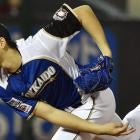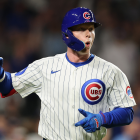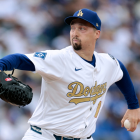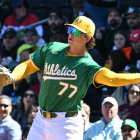Saturday night, the Cubs and Indians will play Game 4 of the World Series at Wrigley Field. The Tribe pulled out a thrilling 1-0 win in Game 3 on Friday to take a 2-1 series lead. Here's how you can watch Game 4.
On the other side of the world, the Nippon-Ham Fighters and Hiroshima Carp wrapped up the 2016 Japan Series on Saturday night local time. The Fighters won the best-of-seven series in six games even after the Carp took Games 1 and 2. Here's the final out and celebration:
ここまでの道のりは
— ちゃん (@Chhaann_91168) October 29, 2016
決して緩やかなものではなくて
ミスもあったけれど
それは仲間がカバーした。
第1・2戦とは違う、勇姿をみせてくれた。
\4連勝で10年ぶりの日本一✨/
ファンの声援がきっと選手に届いたのだと思う。・゚・(*ノД`*)・゚・。
ありがとう、ファイターズ😭💓✨ pic.twitter.com/X4jbQaAqWf
Game 6 was a nail-biter until the late innings. The score was tied 4-4 until the Fighters broke it open with a six-run eighth inning. Brandon Laird's grand slam was the big blow. Here's the video:
Laird, who spent time with the Yankees and Astros from 2011-13, was named series MVP. He headed to Japan two years ago and has hit 34 and 39 home runs the last two seasons. Anthony Bass earned the win in Game 6. He pitched for the Padres, Astros, and Rangers from 2011-15.
"We were on a mission this year," said Laird to Jason Coskrey of the Japan Times. "We had a long season, went through our ups and downs, but we overcame them. Look at us now, we're Nippon champions, it feels great."
This is the third title in franchise history for the Fighters, who had previously won in 1962 and 2006. The Carp reached the postseason this year for the first time since 1991. Had there been a Game 7, it would have featured a premium pitching matchup: Hiroki Kuroda vs. Shohei Otani.
Kuroda, who spent all those years with the Dodgers and Yankees, is simply one of the best Japanese pitchers of his generation. He announced earlier this month that he plans to retire after the Japan Series, win or lose. Kuroda returned to Japan last year to finish his career with the Carp, his longtime team.
The 22-year-old Otani is the best pitcher in the world not currently under contract with an MLB team. He went 10-4 with a 1.86 ERA and 174 strikeouts in 140 innings in 2016 -- he also hit .322/.416/.588 with 22 homers -- and broke his own record for the fastest pitch in Japanese baseball history several times.
Now that the Japan Series is over, the focus will shift to Otani and whether the Fighters will post him for MLB teams this postseason. He's made it clear he wants to come over to MLB, but the team is under no obligation to post him. Here's a primer on the Otani situation.
Why would the Fighters post him?

To cash in, basically. The current postseason system allows the Nippon Pro Baseball team to set a "release fee" of up to $20 million for posting their player. Because Otani is so good, the Fighters will set the release fee at the maximum $20 million, which is financial windfall. Baseball in Japan is booming, though NPB is still a long way off from MLB financially. That $20 million goes a long way.
Also, since the Fighters just won a championship, it might be easier for the fan base to swallow Otani being posted. Had the team lost the Japan Series, letting Otani walk would have been a tough sell. He's their best pitcher -- and one of their best hitters, at that -- and their best chance to win is with him. The Fighters have a good team, obviously, and there would have been temptation to keep him in an effort to win. Now there's not.
Why wouldn't the Fighters post him?
Well, for that reason just outlined: to try to win. The posting system isn't changing anytime soon, so the Fighters will get that same $20 million release fee regardless of whether they post Otani this offseason, next offseason, or three offseasons from now. There's injury risk, sure, and that will factor into their decision. The Fighters could decide to keep Otani, hopefully win another championship or two, then post him.
When would he be posted?
There's no set posting period. If the Fighters do decide to post Otani, they can do it at any time this offseason. In November, in February, whenever. The sooner the better, though. MLB teams will have more money available earlier in the offseason, and you know they're going to hold off on signing other big free agents until they know whether Otani is being posted. They don't want to spend their money too soon and get left out in the cold when he hits the market. The entire free agent market might not budge until we know whether Otani will be made available.
What about waiting until free agency?
It takes eight years for Japanese players to qualify for domestic free agency and nine years to qualify for international free agency. Otani just completed his fourth season, so he won't be free to sign with another NPB team until the 2020-21 offseason, or free to sign with an MLB team until the 2021-22 offseason. That's a long way away. Otani doesn't want to wait that long.
What kind of contract can he receive?
A contract of any size. The posting agreement between MLB and NPB changed a few years ago. Under the old system, MLB teams placed blind bids for the player, and the highest bidder won an exclusive 30-day negotiating window. Because the player could only negotiate with that one team, his leverage was limited.
The current system is more of a true free agency. Once posted, the player has 30 days to negotiate with any and all MLB teams. Whichever team signs him then pays the release fee. The player has much more leverage. Yankees ace Masahiro Tanaka was the first player to come over under the new posting system and he received a seven-year, $155 million contract. Rangers ace Yu Darvish received a six-year, $60 million deal under the old posting system. See? Huge difference.
Why would this be a good move for Otani?
Pretty obvious, right? Money. Sure, Otani probably wants to challenge himself against the best players in the world, but at the end of the day, money talks. Kuroda was the highest-paid player in NPB this season and he made a mere $4.9 million. That's middle reliever money in MLB. Otani himself made $1.83 million in 2016. He'd make 10 times that in MLB, easy. Probably more like 14-15 times that.
Also, the upcoming free agent pitching class is extremely thin. Rich Hill and Jeremy Hellickson are slated to be the best available starting pitchers. Should the Fighters post Otani this winter, he would instantly become the best pitcher on the market, so the bidding war would be fierce. Want a budding young ace? Otani's the only option. There are no alternatives in free agency. He'd cash in huge.
What MLB teams would be interested?
Pretty much all of them. If the Diamondbacks can shell out $34.4 million a year to sign Zack Greinke, any team can afford Otani. It's just a question of whether smaller market teams are willing to commit that much money to one player. Spending, say, one-third of your payroll on one player is generally a bad idea.
That said, Otani isn't old. He's a 22-year-old ace-caliber pitcher -- Otani had a strong season at the plate, but the consensus is he is a pitcher only long-term -- and that type of player is a building block for any team. He fits into every organization's short- and long-term plans. Every team will want him and figures to make an offer.
The biggest suitors are, of course, the big market teams. The Yankees, Dodgers, Cubs, and Red Sox immediately jump to mind. Don't rule out the Giants or Nationals. Or the Tigers. Or the Cardinals. Or the Blue Jays, Orioles, Mariners, and Astros. Every team is going to want Otani. All the usual suspects will get involved plus more.
![[object Object] Logo](https://sportshub.cbsistatic.com/i/2020/04/22/e9ceb731-8b3f-4c60-98fe-090ab66a2997/screen-shot-2020-04-22-at-11-04-56-am.png)


















